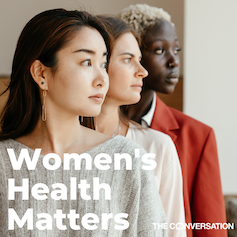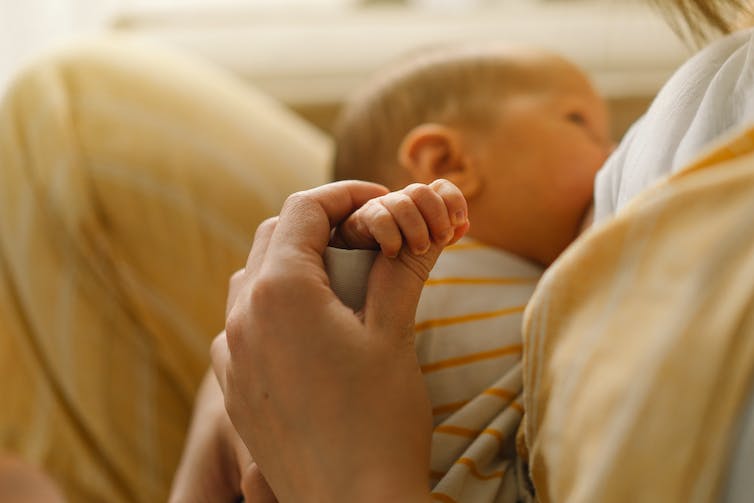SeventyFour/Shutterstock
During the pandemic, there had been issues from healthcare professionals that the restrictions positioned on each day life would result in a disruption in breastfeeding. But our new analysis exhibits that the variety of ladies who continued to solely breastfeed for six months elevated.
And in actual fact, ladies have been 40% extra more likely to solely breastfeed for six months throughout COVID than they have been earlier than the pandemic or now, post-pandemic.
The World Health Organization (WHO) recommends solely breastfeeding for the primary six months of a child’s life. But the UK has had the bottom breastfeeding charges globally. Only 0.5% of ladies breastfed their child till they have been one yr previous within the UK. This is in comparison with 27% of moms within the United States, 35% in Norway and 44% in Mexico, who have been nonetheless breastfeeding after one yr.
When COVID hit, there had been concern that the virus may very well be handed from moms to infants.

This article is a part of Women’s Health Matters, a collection in regards to the well being and wellbeing of ladies and ladies world wide. From menopause to miscarriage, pleasure to ache the articles on this collection will delve into the complete spectrum of ladies’s well being points to supply worthwhile info, insights and sources for girls of all ages.
You could also be enthusiastic about:
Spain is the egg donation capital of Europe – right here’s what it’s wish to be a donor
‘Dirty crimson’: how durations have been stigmatised via historical past to the fashionable day
The orgasm hole and why ladies climax lower than males
Numerous research reported an absence of assist for expectant and new moms who have been breastfeeding through the pandemic. For occasion, one in three ladies desiring to breastfeed reported missing help with correct positioning, whereas one in 4 ladies acknowledged inadequate hospital-based breastfeeding assist. This was in all probability as a consequence of strained healthcare programs and the push to minimise an infection dangers.
Support for brand new moms lessened, which hindered breastfeeding. And pregnant ladies reported very excessive ranges of hysteria and stress, together with uncertainty in regards to the vaccine.
We performed surveys with ladies who gave beginning in Wales between 2018 and 2021 and we examined anonymised NHS breastfeeding well being information collected by midwives and well being guests.
Surprisingly, breastfeeding charges as much as six months peaked in 2020, a time of strict pandemic restrictions. This conflicts with the anticipated lower in breastfeeding charges as a consequence of diminished entry to skilled and social assist.
Our analysis additionally exhibits that roughly six in ten ladies in Wales breastfeed for his or her child’s first feed, however solely three in ten are nonetheless breastfeeding at ten weeks. And greater than 80% of ladies aren’t breastfeeding in any respect by six months.
This discovering has stunned us and others working in healthcare because the pandemic had such a profound influence on each day life worldwide.

Breastfeeding charges as much as six months peaked on the top of the pandemic.
Nastyaofly/Shutterstock
Our examine additionally exhibits that when pregnant ladies report that they don’t intend to breastfeed, then they’re not possible to begin breastfeeding. About 30% of ladies don’t intend to breastfeed in any respect.
However, when ladies say in being pregnant that they intend to breastfeed, then roughly 90% of those ladies do begin doing so. They are additionally 27 occasions extra more likely to breastfeed for six months in comparison with ladies who didn’t intend to breastfeed.
The time issue
But what’s it that helps ladies who do wish to breastfeed, accomplish that for longer? We know that even with out the assist programs and coaching by midwives, extra ladies who wished to breastfeed have been in a position to for longer through the pandemic.
These findings may imply that one factor ladies actually need to assist them to breastfeed is extra time at dwelling with their child, extra time with their associate at dwelling with them, extra privateness and extra versatile working.
If we wish to enhance breastfeeding ranges, it’s attainable that what the pandemic has taught us is the necessity to handle working environments in addition to medical companies.
Breastfeeding advantages
Breastfeeding has many advantages, together with fewer infections, elevated intelligence and the prevention weight problems and diabetes. Breastfeeding additionally has benefits for moms because it lessens the danger of cancers, postpartum bleeding and helps with weight reduction after beginning.
It is healthier for the atmosphere and will be cheaper for some households.
But a examine by Yale School of Medicine earlier this yr discovered {that a} yr of breastfeeding may value households as much as US$11,000 (£8,700) with elevated meals consumption, nutritional vitamins, dietary supplements and provides. It burdened that the barrier of value might influence a mom’s resolution to breastfeed.
But the price of breastfeeding entails extra than simply cash. Another extra hidden value is the time devoted to breastfeeding or pumping breast milk. This highlights how ladies want extra time at dwelling and the way we must be reassessing working environments, particularly for decrease revenue households.
The brief time period positive aspects of getting dad and mom again to work shouldn’t outweigh the long run advantages to our society from having more healthy households. If we wish to enhance breastfeeding charges within the UK, then we have to have a look at the working lives of ladies and their companions throughout the nation.
![]()
This work is funded by the National Centre for Population Health and Wellbeing Research and the National Core Studies funded by the Medical Research Council.
Sinead Brophy receives funding from Health Care Research Wales for Born In Wales and the National Centre for Population Health, MRC for Health Data Research UK, ESRC for Administrative Data Research.
